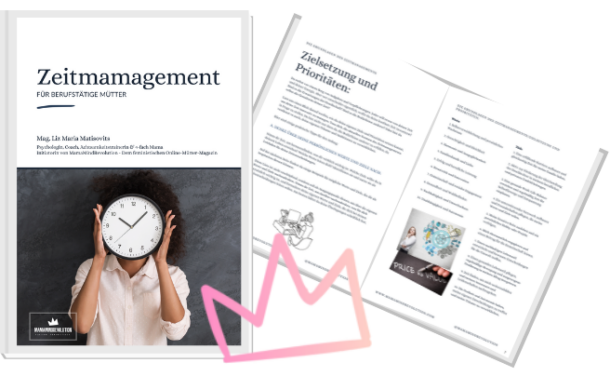As working mothers in a world of constant activity and high expectations, we face a huge challenge: How can we set our own boundaries while being mindful of ourselves? How can we break through the maelstrom of constant giving and functioning and put our wellbeing and needs first?
In this blog post, I would like to talk about the importance of self-care from my perspective as a working mother and give some practical examples of how we can implement it in our everyday lives.
The myth of selflessness and mental load
In our society, mothers are often expected to take on not only the physical, but also the emotional and mental work for their families. The myth of self-sacrifice says that a good mother has everything under control and is solely responsible for the so-called 'mental load'. However, this myth can lead to a crushing burden that drains us as mothers and prevents us from developing ourselves.
A practical example of how we can free ourselves from the myth of selflessness and psychological burden is to consciously share and communicate tasks in the family. It is important not to take on all the responsibility, but to distribute it fairly among all family members.
Let's say you work and have the added responsibility of organising family life. Rather than doing it all on your own, it is important to share the psychological burden with your partner or other family members. This means making clear agreements, delegating tasks and sharing responsibilities.
For example, you could set up weekly family meetings to plan the week together, discuss the tasks to be done and distribute them fairly.
This includes seemingly mundane things like making doctor's appointments for the kids, keeping track of schoolwork or buying summer sandals. These "little things" add up. In the long run, they add up to a psychological burden that should not be underestimated or borne alone. By actively addressing this psychological burden and creating a shared responsibility for it, you relieve yourself and create space for your own needs and interests.
It is time to dispel the myth of selflessness. By supporting each other and sharing responsibilities, we create a fairer and more balanced dynamic in the family. Let's have the courage to face the psychological burden together, to share the tasks fairly and to relieve each other.
Setting boundaries in everyday life
Setting boundaries is easier said than done, especially in an environment of high expectations and constant availability. But it is an important skill that we can develop to strengthen our self-care. A practical example of setting boundaries is in our use of technology.
In today's world, we are constantly surrounded by smartphones, social media and email. We often feel obliged to be available at all times and to respond immediately to messages. However, this can lead to constant distraction and affect our attention.
Here's a simple step we can take to set boundaries and strengthen our presence in everyday life: take technology breaks. Set fixed times when you consciously turn off your phone or switch to flight mode. Use this time to focus on yourself and your family without being disturbed by constant notifications.
By consciously managing your time and attention, you can create space to be present in the moment and recognise your needs. You'll find that you gain more clarity and inner peace when you consciously make time for yourself and don't let external distractions overwhelm you.
Setting boundaries is an ongoing process that takes practice. But it is an important step on the path to greater empowerment and mindfulness. By allowing ourselves to respect our own boundaries and prioritise ourselves, we create space for growth, freedom and fulfilling motherhood.
Prioritising and taking time out: Managing the time factor
As a working mum with limited time, making space for self-care can be a challenge. But despite hectic schedules and a perceived lack of time, there are some tips and tricks that can help you make time for yourself. In addition to setting boundaries and sharing the mental load, the following points can help:
- Set priorities: It is important to be clear about our priorities and recognise that self-care is just as important as work or family commitments. By consciously choosing to make time for ourselves, we give ourselves permission to take our own needs seriously.
- Make use of small time-outs: Self-care does not always mean hours of spa treatments or luxurious getaways. Often all it takes is a short break to recharge your batteries. For example, use your lunch break for a walk in the fresh air or a moment of silence. Just five minutes to breathe deeply and collect your thoughts can make a big difference.
- Seeking support: Mothers should not be afraid to ask for help. Whether it's childcare or help around the house, share the responsibility with your partner, family, good friends or, if financially possible, outsource tasks. It is okay to let someone else take the pressure off you to give you time to yourself.
- Ritualise your self-care: Establish regular rituals or habits that create time for self-care. Whether it's a relaxing bath in the evening, reading a book before bed or a yoga class in the morning, find activities that bring you joy and replenish your energy.
- Build in moments of mindfulness: Consciously include moments of mindfulness in your daily life to enjoy the moment and let your thoughts come to rest. Whether it's drinking tea, going for a walk or simply breathing, focus on the here and now and create little islands of calm.
Finding time for yourself can be challenging, but it is possible. By consciously integrating self-care into our daily lives and valuing ourselves, we create the foundation for a balanced and fulfilled life - as a mother and as a human being.
Conclusion:
As working mothers, we have the power to manage our daily lives with presence and mindfulness. By setting boundaries, challenging the myth of selflessness and being conscious of our time, we strengthen not only ourselves but society as a whole.
By integrating these values into our lives and sharing them externally, we can drive positive change together.









